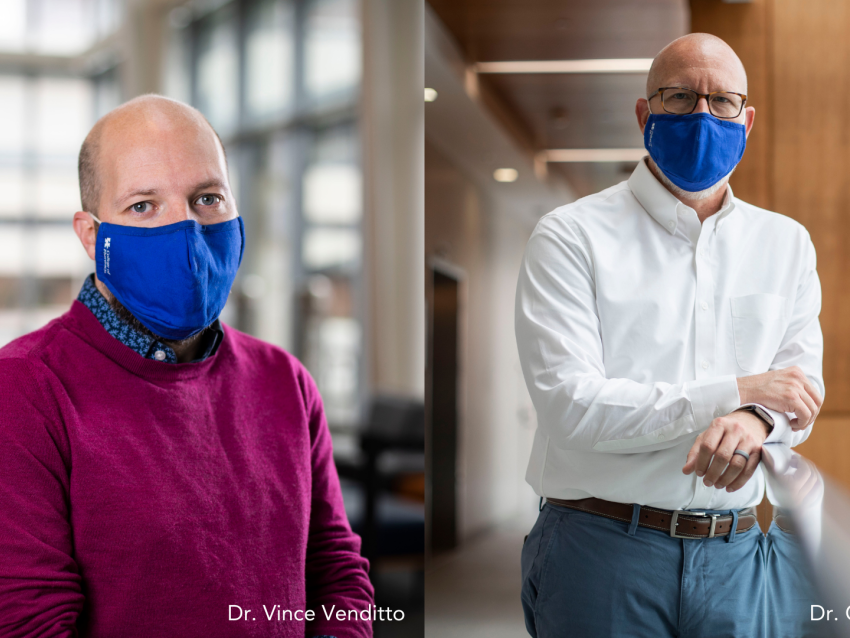
10 Quick Questions about COVID-19 Vaccines
Finding trustworthy information about the new COVID-19 vaccines can feel daunting, especially with the overload of conflicting information seen on the news and social media. With an overwhelming amount of data, it can be difficult to know where to start when trying to understand COVID-19 vaccine safety, efficacy and availability.
We spoke with University of Kentucky College of Pharmacy professors Craig Martin, PharmD., and Vince Venditto, Ph.D., to get answers to some of your common questions. Martin is a pharmacist and associate dean with a background in infectious diseases while Venditto received training in vaccine development and is working on a clinical trial to understand the prevalence of SARS-CoV-2 in Kentucky.
1. Is there more info on how long antibodies help (if at all)?
VENDITTO: Right now, we don’t know how long antibodies last. The first subjects to be immunized with the Pfizer and Moderna vaccines have antibodies that have lasted for eight months, with projections that they will last at least 1 year. For long-term protection, we will want to follow these patients for several years to determine if people are still protected.
2. With more people with antibodies and now the vaccine, could they both help create herd immunity?
VENDITTO: Yes, but I prefer the term community immunity, which is important to eliminate the virus. We have several examples in the U.S. and around the world where vaccinations have resulted in community immunity and the elimination of specific pathogens. Measles is one example in the U.S. that is generally well controlled by vaccination, but there are communities that have a high rate of measles due to a reluctance of vaccine adherence. Similarly, if enough people are vaccinated for SARS-CoV-2, community immunity should reduce the potential for continued viral spread around the world.
3. Based on current projections, when can we expect global immunity—will COVID-19 ever go away?
VENDITTO: There are about 8 billion people in the world, and if everyone were vaccinated, we would need 16 billion doses for a vaccine that requires two injections. While the U.S. and Europe are continuing to vaccinate those in high-risk categories, several countries are not expected to have access to the vaccine until 2022 or 2023. From a global perspective, it is reasonable to imagine that SARS-CoV-2 will have an impact on global health at least until 2024. This could limit travel to and from certain countries for several more years.
4. Do you anticipate masks just being a part of life now?
VENDITTO: There are several countries around the world, most notably China, Japan, South Korea and Singapore, among others, that have experienced outbreaks and epidemics in the past and have adopted masks as a way of life before our current pandemic. I do not predict that mask wearing will remain at the same level as during the pandemic, but I might wear a mask on public transportation during flu season in the future.
5. Should people who are already immunocompromised and on additional medication (e.g., patients with lupus) get the vaccine?
MARTIN: Yes. In fact, those who are immunocompromised are at increased risk for COVID-19 complications and mortality. It is very important for people with these conditions to practice preventative measures, and getting a vaccine is one of those measures.
6. Can you spread COVID to others if you get the mRNA vaccine?
VENDITTO & MARTIN: The vaccines were tested for their ability to prevent severe disease and the data indicates that people who were vaccinated were less likely to be hospitalized after infection. There was also some evidence that the vaccine limited transmission, but the data for this is not conclusive. Additional studies are underway to confirm this finding. Therefore, it’s important to continue wearing a mask and practicing physical distancing to limit the spread to non-vaccinated individuals.
7. How rushed was the vaccine—compared to other vaccines?
VENDITTO: This vaccine took about one year to make, which is significantly faster than the measles vaccine, which took four years to reach approval - the fastest to approval. The technology used to make this COVID vaccine was invented several years prior to the pandemic and was devised to accelerate vaccine development. Obviously, the researchers didn’t know this virus was going to cause a pandemic, but the vaccine is designed based on the genetic code of the virus. So, once Pfizer and Moderna had the genetic sequence they could start making doses of the vaccine for testing, which only took a matter of weeks.
8. How do you find out where you are in the priority line of who gets the vaccine?
MARTIN: The Advisory Committee on Immunization Practices has outlined the priority groups for vaccination. Each state has developed plans for operationalizing those recommendations. Kentuckians can visit https://govstatus.egov.com/ky-covid-vaccine to determine their status.
9. Do I need both injections or just one?
MARTIN: For full effectiveness, the available COVID-19 vaccines require two shots, similar to several vaccines for other diseases (e.g., Hepatitis). It is important to receive both vaccinations. While the first will provide some immunity, the full benefit of the vaccination series requires both.
10. Will the vaccine work against the new variants?
VENDITTO: Slight mutations are a natural component of viruses and it is not surprising that this variant and others have been identified. These small modifications to the viral proteins should have relatively minor effects, if any, on the effectiveness of the vaccine. Our immune systems are designed to respond to these proteins at several different locations on the virus and small modifications, like the one identified in the new variant, are likely too minor to prevent the immune system from doing its job.
Have more questions about the COVID-19 vaccine for Drs. Venditto and Martin? Email your questions to cop@uky.edu with the subject line "VACCINE," and we'll do our best to get you answers.
